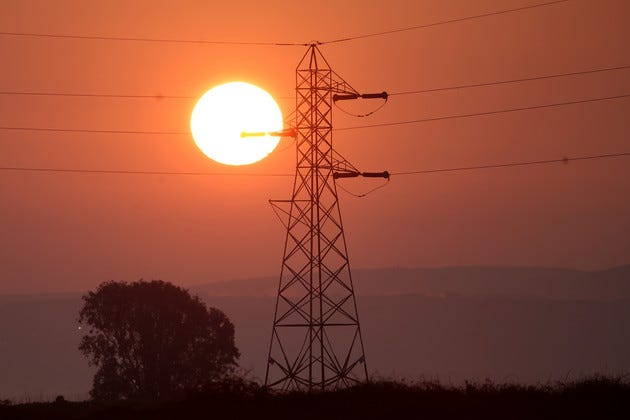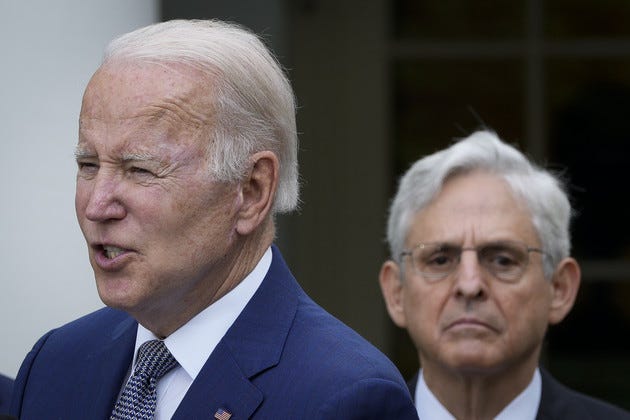Energy regulator’s exit may flummox Biden’s green plans
Allison Clements’ decision to exit the Federal Energy Regulatory Commission could leave the agency in a bind as it tries to update rules needed to prepare the grid for a green power buildout.
Energy regulator’s exit may flummox Biden’s green plans
Allison Clements’ decision to exit the Federal Energy Regulatory Commission could leave the agency in a bind as it tries to update rules needed to prepare the grid for a green power buildout.
The federal power regulator's biggest climate backer says she won't seek another term, a potential blow to President Joe Biden's clean energy rollout. | Justin Sullivan/Getty Images
02/11/2024 07:00 AM EST
The nation’s powerful energy regulator is poised to lose its biggest climate advocate and potentially shut down one of the White House’s best avenues to push its green policies.
Allison Clements told POLITICO last week she won’t seek another term on the Federal Energy Regulatory Commission, the agency crafting rules that could have a massive impact on the nation’s efforts to upgrade the power grid. That buildout is needed to accommodate a huge backlog of wind and solar projects that are critical to meeting the Biden administration’s climate and clean energy goals.
Clements’ departure could come as early as June 30 when her term as a commissioner ends. That would leave the five-member commission with three vacancies — short of the three-person quorum it needs to approve regulations for the power grid and the interstate pipeline network it oversees.
Or she could choose to stay on until the end of the year — which would give the White House valuable time to nominate a replacement and try to steer them through the Senate confirmation process.
That has been no easy task for President Joe Biden, who has butted heads with Sen. Joe Manchin, the West Virginia Democrat who leads the Energy and Natural Resources Committee responsible for vetting FERC’s nominees. Manchin’s opposition to former FERC Chair Richard Glick’s efforts to weigh climate change when assessing natural gas projects led to the progressive regulator’s departure at the end of 2022.
Clements’ statement to POLITICO that she would not seek a second term on the commission came shortly after the White House announced acting FERC chair Willie Phillips was officially named to that role. Phillips, a moderate appointed by Biden, had drawn support from Manchin as well as Senate Republicans for his efforts to speed approvals of fossil fuels infrastructure.
Neither Clements nor her office offered details on when she planned to leave her role, but she said her work at FERC would continue on a soon-to-be-released revamp of the rules for building new electricity transmission.
“I look forward to continuing to work with the chairman and Commissioner [Mark] Christie on finalizing the transition planning rule and addressing other critical issues facing the commission until then,” she said.
Phillips had been designated “acting” chair over a year ago, a status that FERC observers speculated was a bid by the White House to keep open the option to name Clements or another more progressive nominee as chair — and in part to maintain some leverage over Manchin.

Climate and clean energy hawks fear Clements’ departure just a little over a year after Glick’s is a sign that regulators with ambitious goals to speed the clean energy transition may face a difficult political path to being confirmed.
“There’s a sense those are people who have values at odds” with Manchin, said Rep. Sean Casten (D-Ill.).
“That’s a real problem if anyone who would want to do that job has to think political thoughts,” he added. “We should not be politicizing FERC, but we now have these vacancies and a lot of commissioners bending over backward to not say anything that will hurt anyone’s feelings. That’s not a constructive way to run a really important organization.”
Clements often lamented the regulatory system’s sluggish response to the renewable energy boom that has seen clean energy output surpass coal-fired power in recent years. She has advocated rules to put renewable resources on a better footing to compete against fossil fuels, and she has called for rules to speed up the buildout of new power lines and grid infrastructure to accommodate the wave of energy projects spurred by the Inflation Reduction Act.
She has been a major proponent of updating the agency’s rules that guide its analysis of new fossil fuel projects. She argued the commission’s rules around new liquefied natural gas and pipelines — which haven’t been updated since 1999 — should take a closer look at the impacts that new fossil fuel infrastructure has on climate change, and how their pollution has affected low-income areas and communities of color that have suffered disproportionate harms.
The latter position often put her at odds with other commissioners as well as Phillips, who advocated for a more streamlined approach to approving pipelines and LNG exports.
Clements’ announcement has added new urgency for the White House and Senate to fill the two vacant seats as well as Clements’ soon-to-be-empty chair.
Democrats including Manchin appear to be largely united behind one pick — David Rosner, a FERC analyst with expertise on subjects including the power grid and offshore wind. But they will still need to find another Democrat that can appease both Manchin and the White House.
Neither Manchin’s office nor the White House commented on the status of FERC nominees.
Republicans have remained silent on nominees, including potential candidates they could float to be paired with a Democrat to help smooth the nomination process..
MOST READ
A very un-Trumpy performance delivers for Trump at Supreme Court
Trump, who has skirted attacks on Biden’s age, leans in as controversy swirls
‘Confidential’ in name only: Merrick Garland’s delicate decision to release the Hur report
Andy Kim sinks first lady Tammy Murphy in NJ Senate race’s first Democratic convention
One former FERC official who was authorized to speak off the record because of their work in front of the commission questioned why the GOP was not more proactive about bringing forward a candidate given the party’s anger over Biden’s efforts to freeze new export permits for LNG facilities.
Representatives for Senate Majority Leader Mitch McConnell did not respond to requests for comment about the status of a Republican nominee.
FERC, which is an independent agency, has indicated it will continue to move forward as usual with its permitting efforts, which the gas industry says is critical to maintaining a reliable U.S. supply. But without a quorum, FERC will also be at a standstill.
“It’s against Republicans and the gas industry who want speed here. So they should be the ones asking the White House ‘Please get this done,’” said the person.
Neil Chatterjee, a Republican who chaired the commission under former President Donald Trump, said he believes it is the White House, not Republicans, that is holding up the process.
“I don’t think it’s in the White House’s interest to put anyone new on the commission right now while the Chairman is trying to get out a major transmission rule,” he said in an email. “ANY new FERC commissioners would immediately slow down the process regardless of their views on transmission.”
Clements, who has a background as an environmental attorney, often drew the ire of Capitol Hill Republicans.
During a hearing on Capitol Hill last year, Sen. Josh Hawley (R-Mo.) pressed her on a largely debunked accusation from conservative media groups that her attendance at a clean energy group foundation’s dinner was improper.
Clements had argued the meeting did not violate FERC’s ethics rules, an assertion backed by the agency’s ethics office.
In an email, former FERC Chair Glick sympathized with the criticisms Clements has faced as an outspoken regulator on clean energy, relating it to his own efforts to address climate issues that likely contributed to his ousting from the commission over a year ago.
“Speaking from personal experience, it isn’t easy when professional climate deniers take potshots at your credibility simply for having the temerity to acknowledge the energy transition that is taking place around the country,” he said.
“But Commissioner Clements handled these baseless, personal attacks with great grace and professionalism and continues to make her mark on a number of vitally important issues on FERC’s plate.”
Clements continues to have strong backers in the climate and clean energy industries. In a statement, Elise Caplan, vice president of regulatory affairs at the American Council on Renewable Energy, said the group “greatly appreciates Commissioner Clements’ strong support for many critical issues, including interregional transmission, grid enhancing technologies, and accurate capacity valuation, to name a few.”
“Her thoughtful and detailed statements, concurrences, and dissents are a must-read for all those working on the transition to a clean and reliable grid,” she said.
Josh Siegel contributed to this report.




